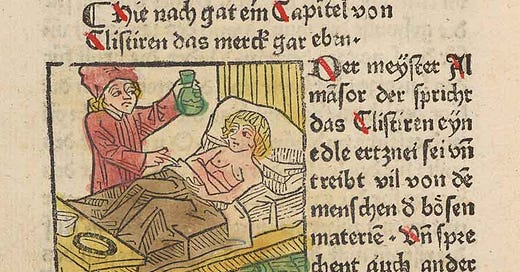Thanks to my pal Phil for the title of this post. As an aesthetic theologian (that sounds wrong, but what do you call someone who works in theological aesthetics? Surely the hairdressers and nail techs of the world don’t own that adjective?), I trust his sense of my demeanour.
This week is the wash-out from ten zaps of radiation, from dependence on steroids to function without pain, from feeling like a zombie much of the time. The week after, scans, low-dose chemo to knock my ego (and white blood cells) down a peg, then I receive back into my body the T-cells stripped from me a few weeks prior. And then a scary couple months of close monitoring to see if 1) my body is accepting of my own modified cells and 2) if not, what sort of havoc they’re wreaking. Interestingly, the lab calls what they’re sending back a “living drug”—it’s meant to basically keep working for many months to keep you healthy.
It’s amazing to me that I’m being attended to with what is essentially “new” technology. Cancer is ancient, but this treatment was approved in 2019 by the government of Canada. Even the side-effects (the most brutal of which is cytokine release syndrome) are now immediately treatable and reversible.

I’ll be in the hospital monitored closely for 7-10 days while this is happening, and then spend several weeks after that schlepping myself back three days a week for testing and more monitoring. I am very grateful to have family and friends who have committed to walking very closely to us during this time to make sure the kiddo is cared for, meals are on the table, the trash is taken out on Mondays, and every little other detail. And the schlepping, I suppose, as I won’t be operating heavy machinery during this period.
I ideally wanted to write something of more substance for this post, but I recognize that details like those above are a major component of why anyone’s reading any of this at all. But there are a couple things I’ve been thinking about.
The first is this thing that’s blazing its way across social media, the Substackverse, and the internet at large: the “Confession of Evangelical Conviction” relating to the 2024 US presidential election. Some of you (Canadians, non-Evangelicals) will have no interest in this, and rightly so. I do not identify as a big-E Evangelical, so my view on it is skewed. Generally, my view on it is also skewed as someone who has spent a great deal of time reading historical documents that are “confessional” in nature.

Others have written plenty on this thing by now, so I just want to say this: you are far better off reflecting on and acting upon your convictions rather than signing onto a generic statement that, ultimately, says nothing of substance. If what you actually want to say and believe is that you don’t think Christians should vote for Trump, it’s worth saying that. And if you think Christians should vote for Harris, say that. I have more respect for the Evangelicals for Harris camp because of this. But I also realize no one in the wide world is asking for my respect.
One of the things floating out there connected to this that actually seems interesting to me is this resource from Intervarsity that is really, genuinely trying to help folks figure out the relationship between faith and politics, at a granular level. It attempts to be nonpartisan and to confront folks’ preconceived notions about the relationship between orthopathy, orthodoxy, and orthopraxy. I think it would be useful across the aisles. The whole point here is to develop empathy with the people with whom you disagree in conjunction with taking the biblical story seriously and properly understanding a little bit of history. It’s a big ask, but I do hope it helps someone.
This week, I’m working on reading Ancient Wisdom for the Care of Souls, put together by Coleman Ford and Shawn Wilhite. I’ve known Shawn for a while—he’s the editor of the series in which my Hilary book will eventually appear. I’m a sucker for works that are trying to remind people of the riches of the past, especially from a pastoral angle, and I’m excited to dig in.






'my Hilary book' as in Hilary of Poitiers?